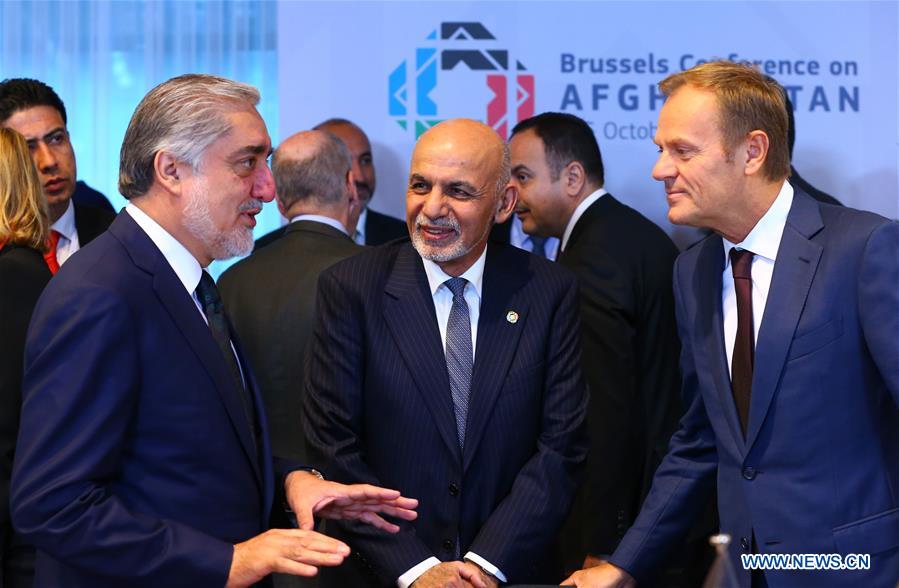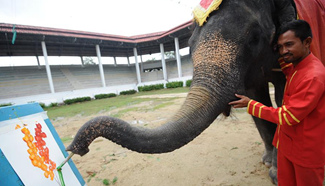
European Council President Donald Tusk (R) meets with Afghani President Ashraf Ghani Ahmadza (C) and Afghan Chief Executive Abdullah Abdullah during the Brussels Conference on Afghanistan in Brussels, Belgium, Oct. 5, 2016. The Brussels Conference on Afghanistan, co-hosted by the European Union (EU) and the government of Afghanistan, kicked off on Tuesday with an event on regional economic cooperation and another on women empowerment in Afghanistan. (Xinhua/Gong Bing)
By Abdul Haleem
KABUL, Oct. 6 (Xinhua) -- The international community in a key meeting on Afghanistan concluded in Brussels on Wednesday pledged a package of 15.2 billion U.S. dollars as a new commitment to support sustainable economic development, strengthening security, improving living conditions and empowering women in the militancy-plagued country, for the next four years beginning 2017.
In the two-day major conference attended by delegates from more than 70 countries and 25 international agencies, the participants recognized Afghanistan's achievements over the past 15 years, but stressed the need for sustainable progress through state building and good governance.
Welcoming the new commitment made in Brussels, Afghan analysts maintained that a new aid package of around 3.5 billion U.S. dollars annually to Afghanistan over the next four years, speaks of the international community's firm support of Afghanistan in the years ahead.
"Certainly, announcing more than 15 billion U.S. dollars to support the state building process and good governance in Afghanistan over the next four years is a strong message to the region that Afghanistan is still a focal point of the global community who will continue to stand alongside Afghans," political analyst General (Rtd) Atiqullah Omarkhil told Xinhua.
The insurgency-plagued and foreign aid-dependent nation is still among the poorest countries in the world, and the Taliban and link-minded extremist groups including al-Qaida and the Islamic State outfit, according to observers, have been fighting to establish their reign here to use the war-torn country as a springboard for destabilizing global order.
More than 4 million Afghans have been living in Pakistan and Iran as refugees waiting for lasting peace to return in their homeland before repatriating, while more than 300,000 others have left their homeland for the developed world, mostly in Europe in search of a better life.
The conflict-ridden Afghanistan's GDP growth, according to recent figures, has dropped from an average of 10 percent between 2002 to 2012, to 1.3 percent in 2014 when the U.S.-led coalition forces ended combat missions here and departed.
In militancy-plagued Afghanistan some 40 percent of its around 30 million population is reportedly living below the poverty and the nation is facing a high unemployment rate and increasing numbers of drug addicts. Afghanistan produced 3,300 tons of opium poppies, the raw material used in manufacturing heroin, to the world in 2015.
According to Afghan observers, the new aid package to Afghanistan announced in Brussels is conditional on the Afghan government fighting against corruption, drug trafficking, instituting electoral reforms, stabilizing security and improving the living conditions of its people.
"It is not a blank cheque for the government. To have the support, it is for the National Unity Government to fight rampant corruption, ensure good governance and improve living conditions of the poor Afghans," Omarkhil told Xinhua in an interview.
The Brussels conference on Afghanistan was held as the Taliban launched a series of offensives in several areas including capturing parts of the strategically important northern Kunduz city along the border with Tajikistan.
Afghan analysts, however, also believe that Afghanistan's dependency on foreign aid for a lengthy period is not the ultimate solution to its problems, advocating that the country should utilize the opportunity to achieve self-reliance and stand on its own feet.
"The new commitment made at Brussels for Afghanistan is a big achievement for the government and a golden opportunity for Afghans to maximize the chance of ensuring good governance, fighting social evils and improving living conditions; otherwise, the global community's interest in Afghanistan will gradually fade," political watcher Haroon Mir told local media.
Earlier in July at a similar conference in Warsaw, NATO member states including the U.S. agreed to provide 4.5 billion U.S. dollars annually for Afghanistan's national security forces through 2020.
"The new aid package pledged in Brussels has raised hope among Afghans for better future," writer Nazifa Mahboubi told Xinhua. However, she warned, "this might be the last chance of receiving global community aid if the government fails to fulfill its commitment in curbing corruption and ensuring good governance in the country."
According to Afghan observers, more than 100 billion U.S. dollars had been injected into Afghanistan between 2002 and 2014 for the rebuilding of the war-torn country, but the vast majority of the aid had been misused due to corruption.
"I think the Brussels conference is an important step in the right direction by the international community in assisting Afghanistan to become self-reliant," George Cunningham, Deputy Head of the European Union's delegation here in Afghanistan, told Xinhua.
"The packaged announced in Brussels virtually guarantees the implementation of the government's programs for the next four years," spokesperson for the Ministry of Rural Development Rehabilitation, Akbar Rustami, maintained.










